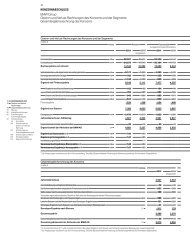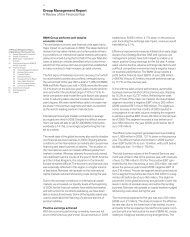Sustainable Value Report 2001/2002 - BMW Group
Sustainable Value Report 2001/2002 - BMW Group
Sustainable Value Report 2001/2002 - BMW Group
Create successful ePaper yourself
Turn your PDF publications into a flip-book with our unique Google optimized e-Paper software.
Shareholders<br />
Government Unions<br />
Suppliers Local communities<br />
ility<br />
Social and cultural<br />
organizations<br />
Environmental<br />
groups<br />
Global initiative for sustainable growth<br />
The <strong>BMW</strong> <strong>Group</strong> has joined 400 other international<br />
companies in supporting the United<br />
Nations Global Compact proposed by Secretary<br />
General Kofi Annan. <strong>BMW</strong> has made a<br />
commitment to ensure that its business activities<br />
conform with UN guidelines and to plan and<br />
implement sustainable growth, respect human<br />
rights, and adhere to worldwide social and<br />
environmental standards. One example of the<br />
<strong>BMW</strong> commitment is its support of the<br />
“Johannesburg World Summit <strong>2002</strong> on<br />
<strong>Sustainable</strong> Development”, a United Nations<br />
global sustainability strategy. <strong>BMW</strong> actively<br />
participates as a member of the relevant<br />
committees including the UNEP DTIE Mobility<br />
Forum, which plays a leading role in preparing<br />
the Johannesburg World Summit <strong>2002</strong>.This<br />
conference will adopt a new charter that will<br />
serve as a basis for the sustainability policy in<br />
the respective countries. As part of the<br />
Johannesburg World Summit <strong>2002</strong> activities, the<br />
<strong>BMW</strong> <strong>Group</strong> will be presenting themes ranging<br />
from CleanEnergy to foreign investment,<br />
environmental best practice, joint ventures,<br />
environmental supply chain management, and<br />
social programs.<br />
Media<br />
Voluntary agreements vs. government<br />
control<br />
The <strong>BMW</strong> <strong>Group</strong> actively helps create the<br />
basic conditions for the environmental policy<br />
that determines the company’s core activities.<br />
In general, the <strong>BMW</strong> <strong>Group</strong> supports the<br />
concept of voluntary agreements as opposed<br />
to government regulations. One example of a<br />
voluntary corporate management tool is the<br />
standardized <strong>BMW</strong> environmental management<br />
system. Examples of voluntary actions include<br />
the use of sulfur-free fuel in all <strong>BMW</strong> fleet vehicles<br />
and the recycling of used cars.The company’s<br />
years of experience will minimize the financial<br />
risk for the <strong>BMW</strong> <strong>Group</strong> when the EU guidelines<br />
on end-of-life vehicles go into effect. <strong>BMW</strong><br />
already complies with the targeted recycling<br />
quota of 85 percent specified for 2005.This is<br />
a result of a comprehensive network of recycling<br />
firms organized in the European Union since<br />
1991. <strong>BMW</strong> is currently the only car manufacturer<br />
to assign recycling tasks exclusively to certified<br />
contract partners.<br />
Forum for <strong>Sustainable</strong> Development<br />
www.econsense.de<br />
Global Compact<br />
www.unglobalcompact.org<br />
23



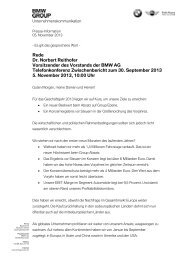
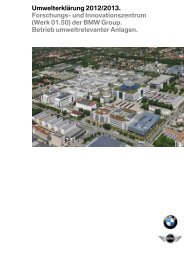

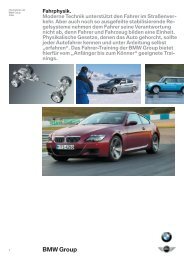
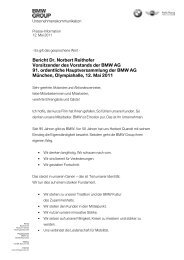
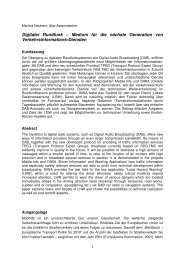
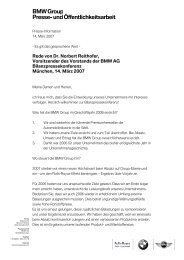

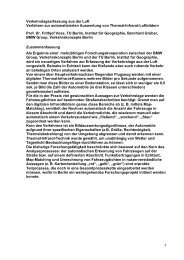
![Vollständiger Bericht [PDF] - BMW Group](https://img.yumpu.com/20706531/1/190x238/vollstandiger-bericht-pdf-bmw-group.jpg?quality=85)



